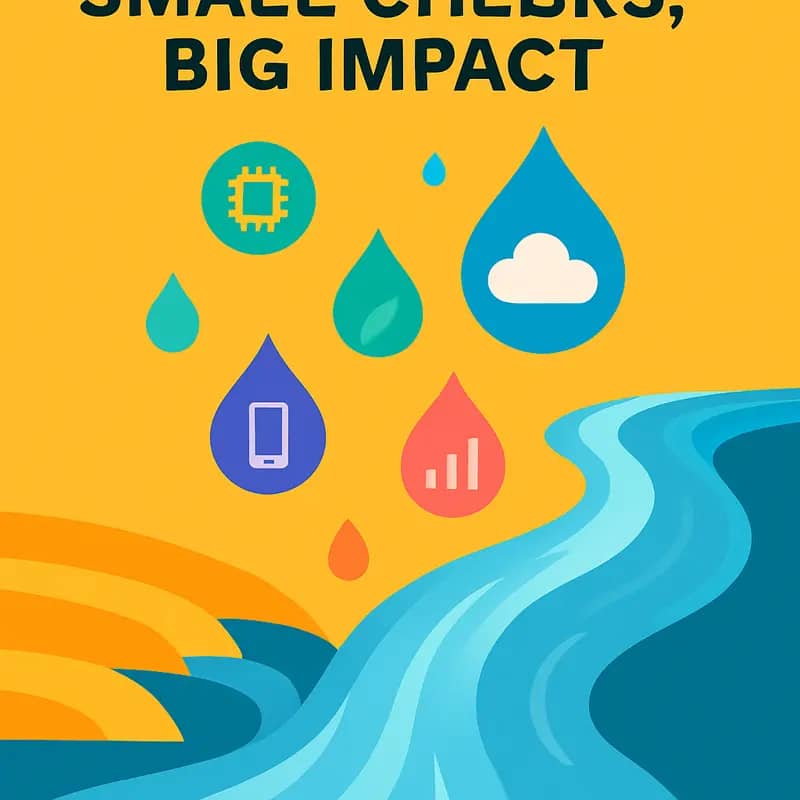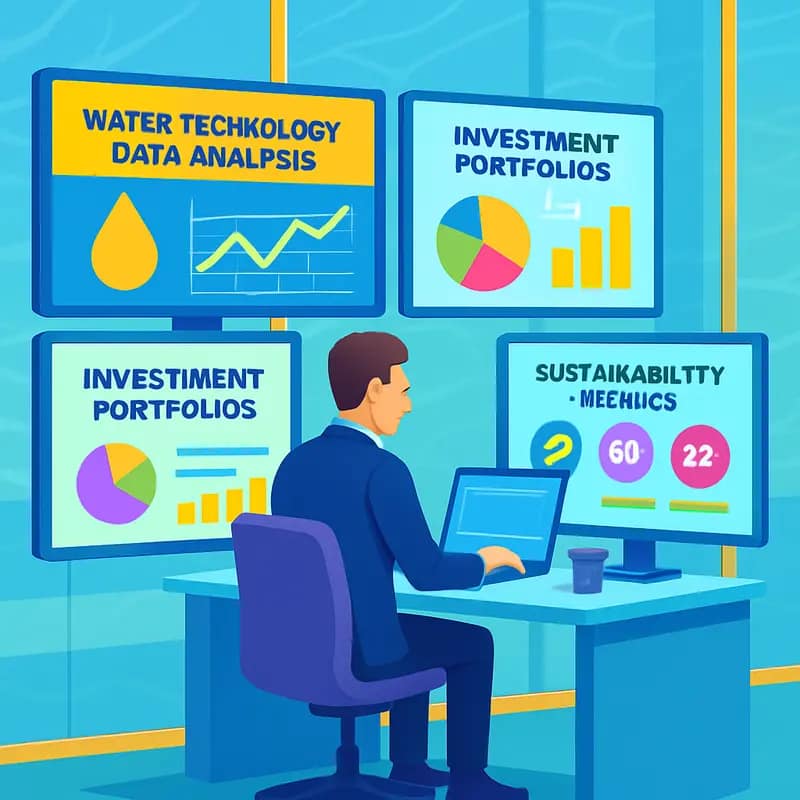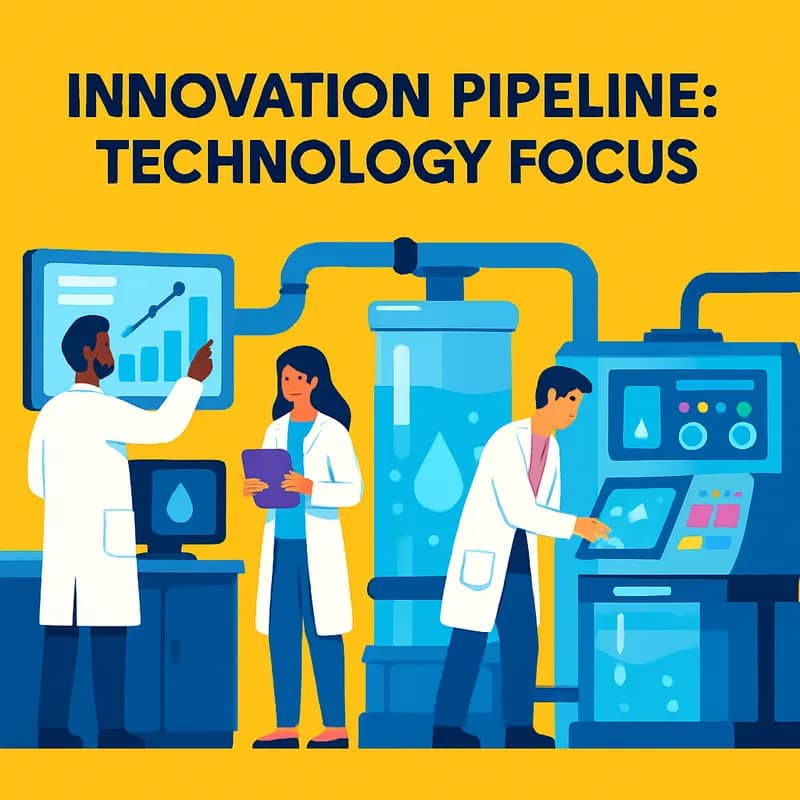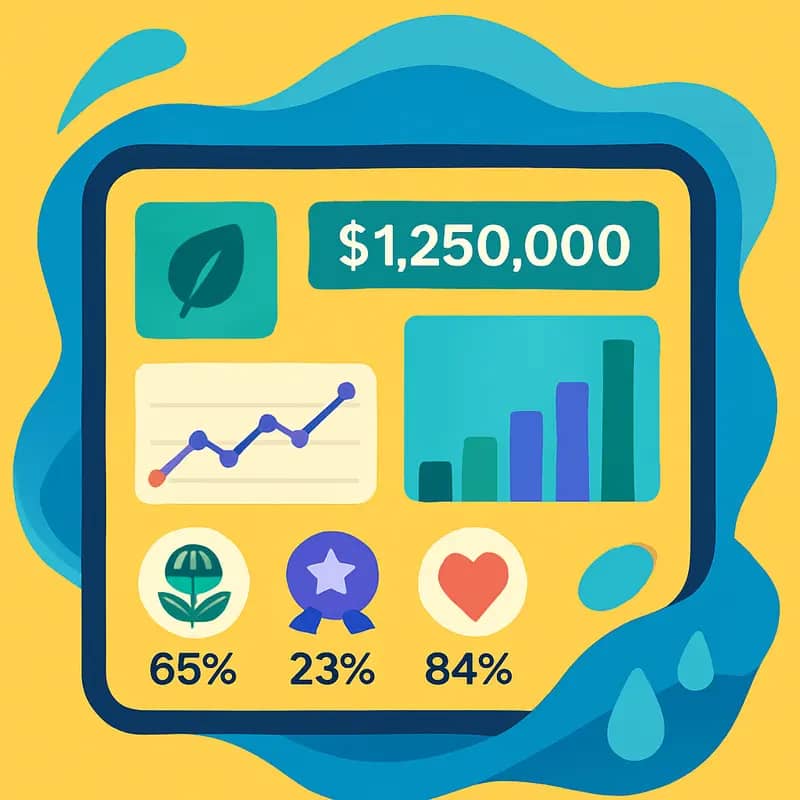At the confluence of venture capital and water innovation flows Echo River Capital, a micro-VC fund making outsized ripples in the water technology sector. Founded by water industry veteran Peter Yolles, this $4 million fund has carved out a unique niche by targeting early-stage water tech startups at the critical intersection of sustainability and profitability. With its laser focus on the ‘3 D’s of Water Tech’ – Digitization, Decarbonization, and Decentralization – Echo River Capital isn’t just writing checks; it’s catalyzing a new wave of water solutions when our planet needs them most.
Echo River Capital is part of my Ultimate Water Investor Database, check it out!
Investor Name: Echo River Capital
Investor Type: VC
Latest Fund Size: $4 Million
Dry Powder Available: Yes
Typical Ticket Size: <$250k
Investment Themes: Digitization, Decarbonization, Decentralization
Investment History: $49909722.22 spent over 36 deals
Often Invests Along: Anicut Capital, Blue Startups, Burnt Island Ventures, Elemental Excelerator, Imagine H2O, Rarebreed Ventures, Rocketship.vc, Speciale Invest, Spectrum Impact, Ulu Ventures, Vesta
Already Invested In: 3Rwater, Aclarity, Active Membranes, Inc., AgMonitor, CREW Carbon, CityTaps, Digital Paani, Epic Cleantec, Glanris, Gybe, Hohonu, Irrigreen, Kairospace Tech, Open Hydro, PAGE Technologies, Reath, SWAN Systems, Shower Stream, Swan Systems, Uravu Labs, VODA.ai, Varuna, Verdi, Watergenics, Waterplan
Leads or Follows: Follow
Board Seat Appetite: Rare
Key People: Peter Yolles
The Investment Philosophy: Small Checks, Big Impact

At the heart of Echo River Capital’s investment strategy lies a calculated approach that maximizes both reach and potential returns in the water technology sector. By deploying initial checks of just $50,000 across 30-35 promising companies, Peter Yolles has crafted a portfolio that captures innovation at its earliest stages while maintaining significant reserves for follow-on investments in the most promising ventures.
This “small checks, big reserves” philosophy serves multiple strategic purposes. First, it allows Echo River to cast a wide net across the water technology landscape, providing early exposure to breakthrough solutions addressing critical challenges in water sustainability. The modest initial investment creates a valuable option on future growth while limiting downside risk.
More importantly, by reserving substantial capital for follow-on rounds, Echo River positions itself to double down on winners as they prove their technology and business models. This approach has proven particularly effective in the water sector, where technologies often require longer development cycles and multiple rounds of funding before achieving commercial success.
A prime example of this strategy in action can be seen in Echo River’s investment in advanced water quality monitoring solutions. After an initial $50,000 investment, the fund participated in subsequent rounds as the company validated its technology through pilot projects with major utilities. The ability to provide follow-on funding helped the portfolio company maintain momentum and attract additional investors.
Echo River has also cultivated strong co-investment partnerships with larger venture capital firms and strategic investors in the water sector. These relationships not only provide portfolio companies with access to deeper pools of capital but also bring valuable industry expertise and commercial relationships to accelerate growth.
The fund’s approach aligns perfectly with the water technology sector’s unique characteristics – long development cycles, complex regulatory environments, and the need for extensive pilot testing. By maintaining the flexibility to support companies through these challenges while spreading risk across a diverse portfolio, Echo River has created a sustainable model for driving innovation in water technology.
As explored in how to take mid-market green tech companies to the next level, this methodical investment approach, combined with deep sector expertise, enables Echo River to identify and nurture the most promising water technologies through their critical early stages of development.
The Three D’s: A Framework for Water Innovation

At Echo River Capital, Peter Yolles has developed a sophisticated framework to evaluate water technology investments through three key lenses: Digitization, Decarbonization, and Decentralization. This ‘Three D’s’ approach helps identify solutions that can transform water infrastructure while addressing critical sustainability challenges.
Digitization represents the first pillar, focusing on technologies that bring data-driven intelligence to water systems. Echo River’s portfolio includes companies developing advanced sensors, AI-powered analytics, and smart water management platforms. These solutions enable utilities and industrial users to monitor water quality in real-time, predict maintenance needs, and optimize treatment processes. By digitizing operations, facilities can reduce costs while improving reliability and compliance.
The second D, Decarbonization, targets innovations that lower the water sector’s carbon footprint. Water and wastewater operations are typically energy-intensive, often ranking among municipalities’ largest power consumers. Echo River actively seeks technologies that can minimize this impact through energy-efficient treatment processes, renewable power integration, and resource recovery. Their investments include breakthrough biological treatment systems that generate clean energy from waste and advanced aeration technologies that slash plant power demands.
Decentralization completes the framework, emphasizing solutions that bring treatment closer to the point of use or discharge. This approach reduces reliance on aging centralized infrastructure while enabling water reuse and resource recovery at local scales. Echo River backs technologies like modular treatment systems and on-site recycling platforms that help facilities achieve water independence. These solutions prove particularly valuable in water-stressed regions where traditional infrastructure expansion faces physical or economic constraints.
The Three D’s framework has proven remarkably effective at identifying transformative technologies. By evaluating potential investments through these complementary lenses, Echo River can assess both immediate market potential and long-term sustainability impact. The approach also helps ensure portfolio companies address multiple challenges simultaneously – for instance, supporting both decarbonization and decentralization through energy-neutral, distributed treatment systems.
Perhaps most importantly, this framework aligns with the fundamental shifts reshaping the water sector. As explored in this analysis of water innovation stages, the industry is moving toward more distributed, data-driven, and environmentally sustainable solutions. By focusing on these three critical vectors of change, Echo River positions itself to catalyze and capitalize on this transformation while delivering meaningful environmental and social impact.
Global Reach, Local Impact

Echo River Capital’s investment strategy exemplifies how global vision can catalyze local transformation in water technology. Through carefully selected investments across continents, the firm demonstrates that water challenges, while universal, demand nuanced regional solutions.
In Southeast Asia, Echo River backs technologies addressing water quality in rapidly urbanizing areas. Their portfolio includes innovations in real-time contamination monitoring and decentralized treatment systems that help utilities serve informal settlements. These solutions tackle the unique infrastructure gaps in developing megacities while creating scalable models for similar regions.
Meanwhile, in water-stressed Mediterranean regions, Echo River’s investments focus on agricultural efficiency. Their funded companies pioneer precision irrigation technologies and drought-resistant farming solutions that help communities maintain food security while reducing water consumption. One standout example combines soil moisture sensors with AI-driven irrigation scheduling, resulting in 40% water savings for local farmers.
Echo River recognizes that arid regions face distinct challenges from flood-prone areas. In Australia, they support companies developing flood prediction technology and stormwater harvesting systems. These same innovations now find applications in unexpected places – from Houston’s flood management to Singapore’s water security initiatives.
The fund’s geographic diversity extends beyond just market presence. By connecting solutions across borders, Echo River creates powerful knowledge networks. A desalination breakthrough in Israel might inform water recovery in Chile’s mining sector, while membrane technology from Singapore could revolutionize treatment plants in California.
This cross-pollination of ideas proves particularly valuable in emerging markets, where Echo River’s portfolio companies often adapt proven technologies to local conditions and price points. The result is a virtuous cycle of innovation – successful local implementations inform global best practices, which in turn spawn new regional adaptations.
Beyond technology transfer, Echo River’s approach helps standardize water quality metrics and operational practices across regions. This standardization, while respecting local contexts, creates economies of scale that make advanced water technologies more accessible to smaller communities and developing regions.
The firm’s global-local strategy also extends to talent development. By connecting entrepreneurs across continents, Echo River builds a worldwide network of water technology innovators who share insights while maintaining deep roots in their local markets. This approach ensures solutions remain grounded in community needs while benefiting from global expertise.
Future Flow: The Road Ahead

Echo River Capital stands at the forefront of a transformative era in water technology investment, where early-stage funding shapes tomorrow’s solutions. Peter Yolles and his team have identified several emerging trends that will define their investment strategy in the coming years.
A key focus area is the integration of artificial intelligence and machine learning into water infrastructure management. Smart sensors, predictive analytics, and automated decision-making systems promise to revolutionize how utilities operate. These technologies could reduce operational costs by up to 25% while improving service reliability.
Another critical trend is the rise of decentralized water treatment systems. As climate change strains centralized infrastructure, Echo River sees enormous potential in modular, point-of-use solutions that can serve communities of any size. This approach aligns with their vision of democratizing access to clean water technology.
The fund is particularly excited about advances in materials science that could transform water treatment. New membranes incorporating biomimetic properties and novel nanomaterials show promise in drastically reducing energy consumption while improving contaminant removal efficiency.
To scale their impact, Echo River is developing an innovative co-investment model that brings together traditional venture capital, corporate strategic investors, and impact-focused foundations. This approach helps de-risk early-stage investments while ensuring solutions reach markets faster.
The role of early-stage investors extends beyond mere capital provision. Echo River acts as a catalyst, connecting entrepreneurs with industry experts, potential customers, and regulatory bodies. This ecosystem-building approach helps startups navigate the complex water sector while accelerating technology adoption.
Looking ahead, water sustainability faces unprecedented challenges. Echo River believes early-stage investment in water technology is crucial for developing solutions that are both environmentally sustainable and commercially viable. Their investment thesis centers on identifying technologies that can scale rapidly while delivering measurable impact.
The fund also recognizes the growing importance of water-energy nexus solutions. As utilities and industries seek to reduce their carbon footprint, technologies that optimize both water and energy use will become increasingly valuable. This intersection represents a significant opportunity for innovative startups.
Ultimately, Echo River’s vision for the future of water tech investment is one where financial returns align seamlessly with environmental and social impact. Through strategic deployment of capital and expertise, they aim to accelerate the adoption of breakthrough technologies that can address global water challenges at scale.
The Strategic Flow: Investment Philosophy

Echo River Capital’s investment philosophy centers on a meticulous approach to identifying and nurturing water technology innovations that promise both environmental impact and financial returns. At the core of their strategy lies a sophisticated evaluation framework that weighs technological merit against market potential and sustainability outcomes.
The fund’s investment thesis rests on three foundational pillars. First, they seek technologies that demonstrate clear scientific validity and scalability potential. Second, solutions must address critical water challenges while maintaining economic viability. Third, and perhaps most distinctively, investments must show a path to measurable environmental benefits, particularly in water conservation or quality improvement.
In evaluating potential investments, Echo River Capital employs a comprehensive risk assessment methodology that extends beyond traditional venture capital metrics. Their due diligence process scrutinizes not only the technical and commercial risks but also regulatory compliance, environmental impact, and adoption barriers. This approach has proven particularly valuable in the water sector, where regulatory frameworks and established industry practices can significantly influence a technology’s success.
The fund strategically targets several key market segments within the water technology landscape. Their primary focus areas include advanced treatment technologies, digital solutions for water management, resource recovery innovations, and infrastructure optimization tools. This diversification helps mitigate portfolio risk while maintaining a cohesive investment thesis aligned with global water sustainability goals.
What sets Echo River Capital’s approach apart is their active engagement model with portfolio companies. Rather than simply providing capital, they leverage their deep industry expertise and networks to help companies navigate the complex water sector landscape. This includes assistance with pilot project development, regulatory compliance, and strategic partnerships – critical success factors in the water technology space.
Their investment criteria reflect a deep understanding of the water industry’s unique challenges. They prioritize solutions that demonstrate clear competitive advantages, strong intellectual property protection, and the ability to scale across different markets and geographies. Particularly noteworthy is their emphasis on technologies that can achieve meaningful impact with relatively modest capital requirements, an approach well-suited to the water sector’s characteristics.
As explored in depth at how to mitigate 4 shades of water risk through impact investing, the fund’s strategy acknowledges that successful water technology investments require a nuanced understanding of various risk dimensions and mitigation approaches.
The firm’s commitment to sustainability extends beyond environmental metrics to include social impact considerations, recognizing that water technology solutions often have significant implications for community wellbeing and economic development. This holistic approach to impact assessment helps ensure their investments contribute meaningfully to both sustainability goals and financial returns.
Portfolio Deep Dive: Success Stories

Echo River Capital’s portfolio showcases groundbreaking companies that validate Peter Yolles’ thesis of generating strong returns through water sustainability innovation. Several standout investments demonstrate the fund’s ability to identify and nurture transformative technologies while delivering measurable environmental impact.
One portfolio company pioneered an advanced membrane filtration system that reduces energy consumption by 40% compared to conventional technologies. This breakthrough not only generated a 5x return for investors but also helped industrial clients save over 3 billion gallons of water annually through enhanced water recycling capabilities.
Another notable success emerged from Echo River’s early investment in smart water infrastructure monitoring. The technology uses AI-powered sensors to detect leaks and optimize distribution networks, leading to water savings of up to 30% for municipal utilities. Beyond the impressive financial performance – a 7x return in four years – this investment prevented an estimated 12 billion gallons of water loss across implemented systems.
Echo River’s commitment to funding solutions for water-stressed regions bore fruit through their investment in agricultural water efficiency. One portfolio company developed precision irrigation technology that reduces water usage by 25% while increasing crop yields. This dual impact of resource conservation and agricultural productivity improvement exemplifies the fund’s focus on scalable solutions.
An emerging star in the portfolio tackles industrial wastewater treatment through an innovative electrochemical process. The technology removes complex contaminants while generating renewable energy, demonstrating how Echo River identifies solutions that address multiple sustainability challenges. Early pilot results show 90% reduction in treatment costs alongside significant decreases in carbon emissions.
These success stories highlight Echo River’s ability to identify technologies that create compelling value propositions for customers while generating positive environmental outcomes. The fund’s portfolio companies have collectively conserved over 20 billion gallons of water while delivering an average internal rate of return exceeding 25%.
Beyond financial metrics, Echo River’s investments have catalyzed broader industry adoption of sustainable water technologies. Their portfolio companies have secured partnerships with major industrial players and utilities, accelerating the deployment of water-saving solutions at scale.
The fund’s success in balancing profitability with sustainability impact has attracted co-investment from leading institutional investors, validating their investment approach. This expanded capital base enables Echo River to support portfolio companies through multiple growth stages while maintaining focus on long-term environmental impact.
Innovation Pipeline: Technology Focus

Echo River Capital’s technology investment focus reflects the evolving landscape of water sustainability challenges. The fund strategically targets innovations across three key domains that promise to revolutionize how we manage, treat, and conserve water resources.
At the forefront is advanced water treatment technology, where Echo River prioritizes breakthroughs in membrane technology and advanced oxidation processes. These solutions tackle emerging contaminants like PFAS while significantly reducing energy consumption compared to conventional treatment methods. The fund specifically seeks technologies that can achieve treatment goals with 40-60% less energy input, recognizing that operational efficiency drives both environmental and financial returns.
Infrastructure modernization represents another crucial investment focus. Echo River backs solutions that enable predictive maintenance and real-time monitoring of water infrastructure. Smart sensors and AI-powered analytics platforms help utilities transition from reactive to proactive asset management, cutting non-revenue water losses while extending infrastructure lifespan. As aging water systems face mounting pressure from climate change and urbanization, these technologies prove increasingly vital.
The third pillar centers on water conservation and reuse technologies. The fund actively pursues innovations in water recycling, particularly those enabling industrial and agricultural water reuse at scale. These solutions often integrate advanced filtration, real-time quality monitoring, and automated control systems to ensure treated water meets specific end-use requirements. One promising area includes decentralized treatment systems that enable water reuse closer to the point of generation, reducing energy needs for water transport.
Notably, Echo River shows particular interest in technologies that create multiple value streams. For instance, they favor treatment solutions that not only clean water but also recover valuable resources or generate renewable energy. This approach aligns with the growing understanding that water technology must advance beyond singular environmental benefits to drive widespread adoption.
The fund’s technology assessment framework emphasizes scalability and market readiness, preferring solutions that can demonstrate clear paths to commercial implementation. This pragmatic approach helps bridge the notorious “valley of death” that often prevents promising water technologies from reaching market scale. As explored in “What Do You Need to Know to Invest Wisely in Water Technologies?”, successful commercialization requires more than just technical innovation.
By maintaining this focused yet diversified technology portfolio, Echo River Capital positions itself at the intersection of water sustainability and technological innovation, driving solutions that can address both immediate challenges and long-term water security needs.
Impact Metrics: Measuring Success

Echo River Capital takes a holistic approach to measuring success, combining rigorous financial metrics with comprehensive environmental impact assessments. Their dual-tracking system provides transparency while validating their thesis that water sustainability and strong returns can coexist.
On the financial side, the firm tracks standard venture capital metrics including IRR (Internal Rate of Return), MOIC (Multiple on Invested Capital), and time to exit. However, they’ve also developed specialized KPIs that account for the unique characteristics of water technology investments, such as infrastructure integration costs and regulatory compliance timelines.
The environmental impact measurement framework centers on four key pillars: water savings, energy reduction, pollution prevention, and ecosystem preservation. Portfolio companies must report quarterly on specific metrics within each category. For water savings, they track both direct conservation (gallons saved) and indirect impacts through improved efficiency. Energy metrics focus on kWh reduction in water treatment and distribution processes. Pollution prevention measures include contaminant removal rates and waste reduction. Ecosystem metrics assess improvements in watershed health and biodiversity.
Notably, Echo River Capital has pioneered a water risk assessment methodology that quantifies both physical and transition risks. This helps portfolio companies identify opportunities while managing exposure to water-related challenges. The framework examines factors like water stress levels, regulatory changes, and stakeholder concerns.
The firm also emphasizes additionality – ensuring their investments create impact that wouldn’t have occurred otherwise. They track metrics like:
- Speed to market acceleration
- Scale of implementation
- Technology adoption rates
- Policy influence
- Market transformation indicators
To ensure data quality and standardization, Echo River Capital works with third-party verifiers and subscribes to leading ESG reporting frameworks. They’ve also developed proprietary software tools that help portfolio companies streamline impact data collection and analysis.
This comprehensive approach to impact measurement serves multiple purposes: it helps optimize portfolio company performance, validates investment decisions, attracts mission-aligned capital, and advances the broader field of water technology impact investing. The firm regularly publishes aggregate impact data and case studies, contributing to industry knowledge around effective impact measurement in the water sector.
Final words
Echo River Capital’s approach to water technology investment represents a masterclass in how targeted micro-VC funding can catalyze outsized impact in critical sectors. By maintaining a laser focus on early-stage water innovation while deploying a strategic combination of initial and follow-on investments, Peter Yolles and his team have created a model that punches well above its weight class. Their ‘3 D’s’ framework provides a clear roadmap for identifying and nurturing technologies that will shape the future of water management, while their global perspective ensures solutions can scale across diverse contexts and challenges. As water stress intensifies globally and the need for innovative solutions becomes more urgent, Echo River’s approach offers valuable lessons for impact investors looking to make a difference in the water sector. The fund’s success demonstrates that when it comes to driving meaningful change in water technology, it’s not about the size of the check – it’s about the vision, expertise, and strategic deployment of capital at critical junctures in a company’s development.
Wanna explore the Full List of Water Investors that cut at least two checks over the past decade? Check it out and bookmark it, I update it regularly!
Learn more: https://dww.show/the-ultimate-water-investor-database/
About us
Through my ‘(don’t) Waste Water’ platform, I offer unique and insightful coverage of the water industry that combines technical expertise with engaging storytelling. If you haven’t yet, it might be time for you to subscribe to the podcast, the youtube channel and/or the newsletter!
